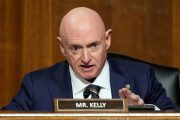On Wednesday three top people in the Operation Car Wash/Petrobras Oil scandal were arrested in Brazil, possibly signaling the beginning of the end of the reign of Brazilian President Dilma Rousseff (shown).
Ever since businessman Hermes Magnus told police in 2008 that a gang of criminals was trying to launder money through his electronics company, using the Tower Gas Station (and car wash and currency exchange) as the center, the investigation has grown ever wider.
Massive sums from Petrobras executives were transferred to overseas bank accounts using Tower’s currency exchange. So far, 57 of those executives — with connections to politicians at the highest levels of Rousseff’s regime —have been arrested, and 46 of them convicted. Another 200 are holding their breaths while they are being investigated.
When Petrobras announced the discovery of two new immense oil fields in Brazil — the Tupi in the Santos Basin and the Juniper just off the coast of Rio de Janeiro — corrupt politicians and businessmen saw their opportunity, and they took it. Petrobras went to market to sell company stock and new bonds to raise the $25 billion it estimated it would take to develop the fields. In the process, Petrobras became the fourth largest company in the world by market cap, and the world’s largest debtor along the way. Contracts were being let and insiders had a field day, raking off commissions on some $22 billion worth of those contracts of an estimated $3.4 billion and possibly much more.
One of those arrested on Wednesday was José Carlos Bumlai, a “businessman” with intimate connections to Rousseff’s predecessor, Luiz Inacio Lula da Silva (known as “Lula”), helping to make him one of Brazil’s richest, and most corrupt, citizens.
Another arrested on Wednesday for taking kickbacks in exchange for favors was Senate leader Delcido Amaral, a member of Rousseff’s Workers Party and a key player in the pay-to-play scam.
The third top-tier figure arrested Wednesday was Andre Esteves, a Brazilian billionaire who allegedly used Amaral as the go-between in paying off a middle-manager at Petrobras to keep quiet about the scam. That manager, Nestor Cervero, couldn’t hide the $13,200 a month he was receiving from Esteves (through Amaro) in local banks, and so used the currency exchange at Tower Gas to secrete his money overseas.
According to Kenneth Rapoza, a Forbes contributor who has been following the widening scandal from the beginning, the investigation hinges on bringing sufficient pressure to bear on the three arrested on Wednesday to persuade them to plea bargain their way out of prison time by spilling the beans on all those working the scam. The strategy has already worked, according to Rapoza:
One name has led to another, which has led to another, which has led to this: some of the closest men to Dilma (Rousseff) and Lula.
[The three arrested on Wednesday] will not want to spend the rest of their lives in jail. They too will sing, sing loud and clear…
If they have anything that implicates Dilma and/or Lula in this mess, it will not only destroy the Workers’ Party — a Christmas wish for the opposition — but it will surely lead to an impeachment [of Rousseff].
Impeachment is what hundreds of thousands of Brazilians called for when they marched in protests back in March and April, filling the streets of Rio and the papers with editorials denouncing Rousseff’s continued claims of innocence of the whole affair while she was — wait for it — Minister of Energy under Lula for five years before being elected president in 2010, and chair of Petrobras. Especially outraging the citizens was her promise during her election campaign in 2010 “to supercharge the economy while avoiding the corruption and mismanagement that have plagued other oil-rich countries in the developing world.”
If the investigation plays out the way Rapoza thinks it will, Rousseff will be exposed for not only cheating, but lying about her cheating. The credit agency Fitch is watching the situation closely and threatening to move its rating on Brazil’s massive government debt to junk status. This would cause further pain not only to bondholders but also to stockholders who have seen shares of Petrobras plummet by 50 percent in just the last 12 months, and to Brazilians who have seen their elected officials scam Petrobras for billions.
When corruption meets corruption, citizens become slaves, and poor. Though Brazil was once touted as an economic miracle and a member of BRIC (Brazil, Russia, India and China) that was predicted eventually to outgrow the economies of the developed world, that corruption has set the country back at least a decade, if not longer, as corrupt officials working hand-in-glove with unscrupulous businessmen saw their opportunity and took it.
Photo of Brazilian President Dilma Rousseff: AP Images
A graduate of an Ivy League school and a former investment advisor, Bob is a regular contributor to The New American magazine and blogs frequently at www.LightFromTheRight.com, primarily on economics and politics. He can be reached at [email protected].
Related article:




